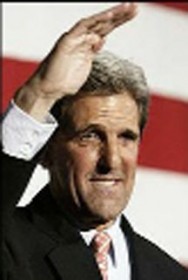WASHINGTON, (Reuters) – The U.S. Senate approved a landmark nuclear arms control treaty with Russia yesterday, giving President Barack Obama a major foreign policy victory in his drive to improve ties with Moscow and curb the spread of atomic weapons to other nations.

The Senate voted 71-26 in favour of the New START treaty between the former Cold War foes after a contentious debate with Republican leaders that threatened traditional bipartisanship on security affairs.
“This treaty will enhance our leadership to stop the spread of nuclear weapons and seek the peace of a world without them,” Obama told a news conference after the vote, praising the bipartisan nature of the final result.
The vote was an endorsement of Obama’s efforts to improve relations with Russia and curb the pursuit of nuclear weapons by countries like North Korea and Iran.
Russian Foreign Minister Sergei Lavrov said the process was “a new gold standard for concluding agreements of this kind.”
“Not only does the treaty facilitate a strengthening of the security of Russia and the USA but it will also have a positive effect on international stability and security in general,” Lavrov told the Interfax news agency.
The Russian parliament has yet to approve the treaty — signed by Obama and Russian President Dmitry Medvedev in April — but the Kremlin-backed United Russia party is dominant, so ratification there is all but assured.
Still, Russian lawmakers will review the terms in the U.S. Senate’s resolution of ratification.
“Taking into account the amendments added by senators, we are forced to undertake a deep and thorough analysis of the text … since we are speaking about the national security of our country,” Leonid Slutsky, deputy chair of parliament’s international affairs committee, told Interfax.
Senator John Kerry, who led the debate as chairman of the Foreign Relations Committee, said the treaty was a message to Iran and North Korea “that the international community remains united to restrain the nuclear ambitions of countries that operate outside the law.”
“We send a message that the two countries that possess 90 percent of the world’s nuclear weapons are fulfilling their obligations to reduce their arsenals in a responsible manner,” Kerry said.
The treaty will cut long-range, strategic nuclear weapons deployed by Russia and the United States to no more than 1,550 on each side within seven years. Deployed missile launchers will be cut to no more than 700 on each side.
The agreement also creates an inspection and verification process to replace the one that expired nearly a year ago with the end of the original START accord.
The new treaty has wide support in military and diplomatic circles. NATO Secretary General Anders Fogh Rasmussen said it would make a “significant contribution” to regional security and U.N. Secretary-General Ban Ki-moon said it was a “clear message” supporting nuclear disarmament and nonproliferation.
U.S. CREDIBILITY AT STAKE
Passage of the treaty with support from 13 Republicans was a big victory for Obama just weeks after his Democrats lost control of the House of Representatives and narrowly retained control of the Senate in the Nov. 2 congressional elections.
Republican senators had sought to amend the treaty this week to allow for more inspections, more deployed missiles and to force talks on tactical nuclear weapons. But Democrats, who still control the chamber 58-42 until the new Congress sits in January, easily defeated the amendments.
Kerry said Senate approval was critical for sustaining Obama’s credibility with fellow world leaders and supporting his ability to advance the U.S. agenda. Officials in the Obama administration have said passage of the New START treaty was a prerequisite for turning to other arms control issues such as reducing tactical nuclear weapons.




